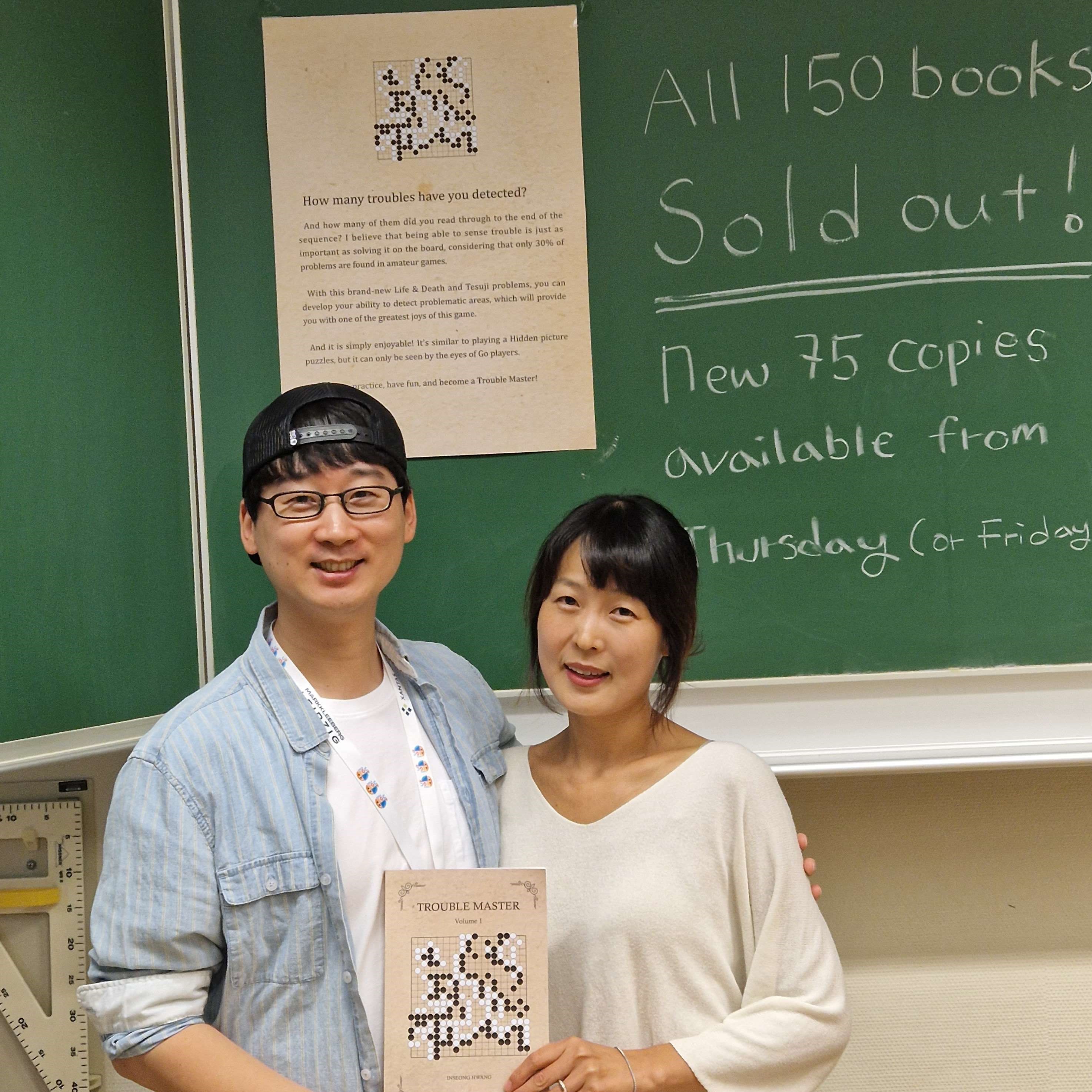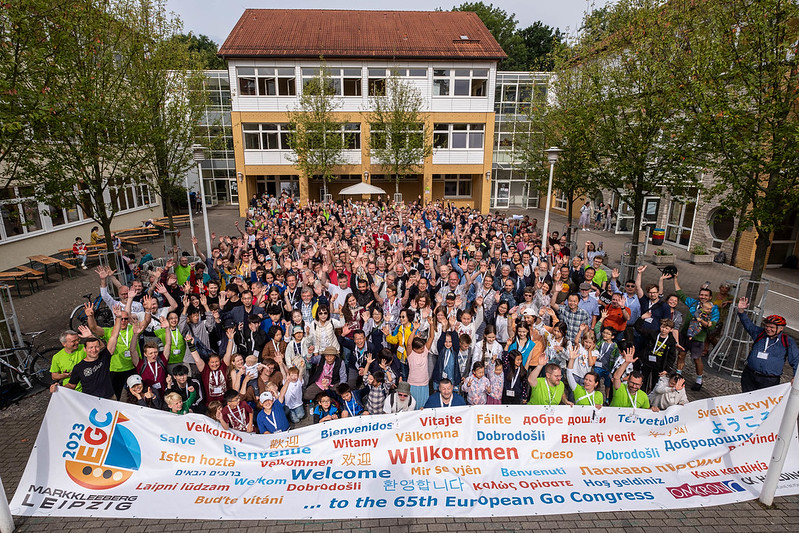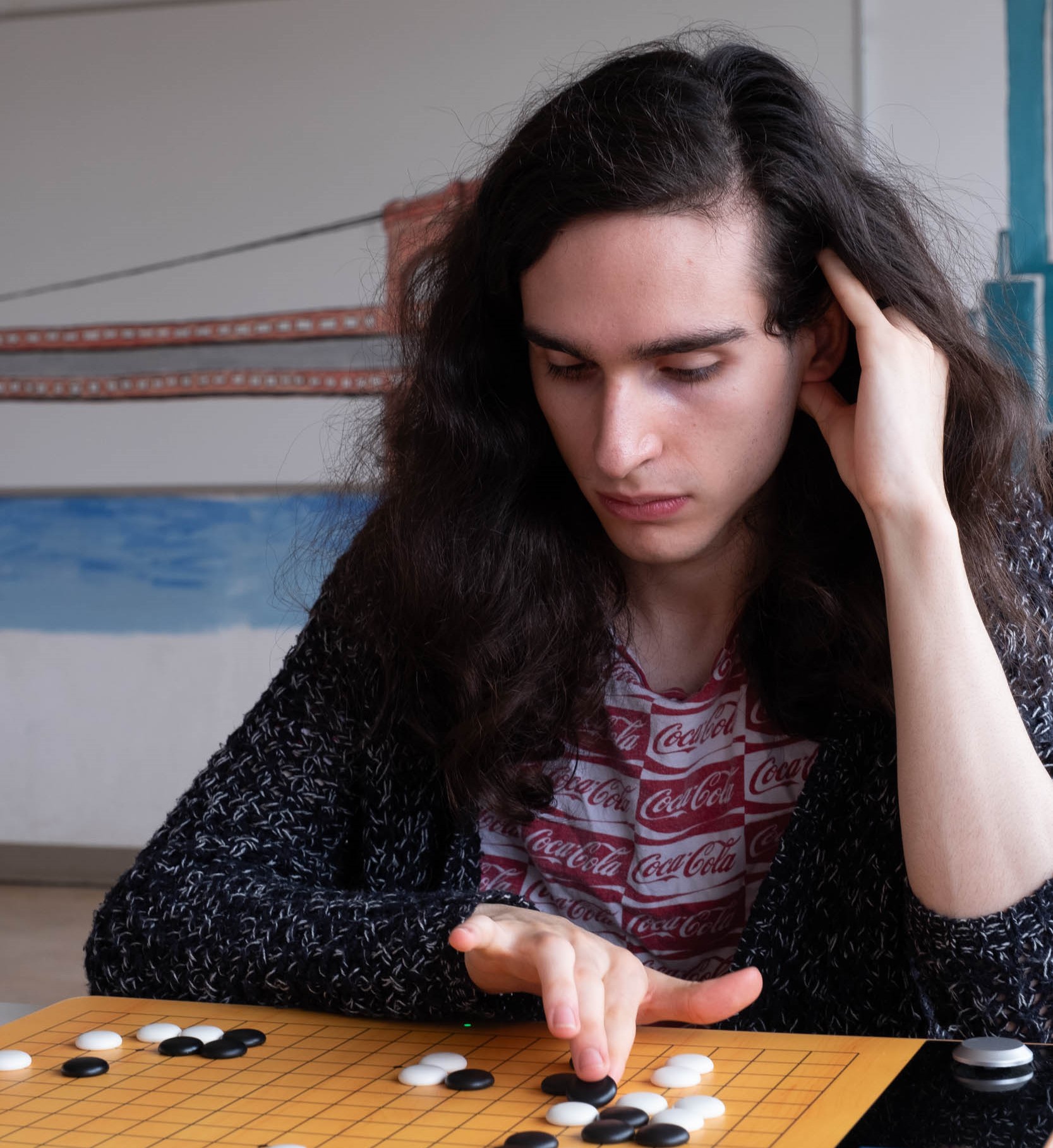Hwang In-Seong 8-dan, renowned Go teacher and up-and-coming author, was kind enough to sit down for an interview with us to talk about the seven types of Go players, his hot new book „Trouble Master“, and differences in mentality between Korea and Europe.
Here’s what he had to say:

Jeremy Kaiser: What’s your age and your profession?
Hwang In-Seong: I’m 40 years old. I was an Korean insei. After that, I went to the Go department of Myongji University to study Go. Then, I worked as a commentator for Korean Baduk TV for 3 years, and then by chance I came to Europe. I really liked it and wanted to stay. I had to go back to Korea for military service reasons for 2 years, then I came back. I’ve been staying in Europe for more than 15 years already. I lived in Berlin, Frankfurt, Zurich, Geneve and now Grenoble. Maybe next year I will be in Barcelona (laughs).
JK: How would you describe your style of Go?
HI: There are seven types of Go players. I’m the “boss” type of player. When I have an issue, I don’t try to find the solution myself…I get my opponent to do it. Like a boss…my opponent does it and I get the profit from it – I am an aggressive type of player. For example, when I need to protect my weakness, instead I attack my opponent’s group. My opponent moves, giving me the chance to fix my weakness with perfect timing. Or when I want to make territory, I aim at opponent’s weakness to make him move and get some points from it. But I know I have limited strength with this style so I try to play calmer.
JK: So, there are six other types of Go players? Is it your theory?
HI: Yes, it’s my theory. [Go players can be categorized into] theoretical players and technical players. There are three types of theoretical players: “The Philosopher” – a player who thinks a lot and have lots of strategies and ideas but has difficulties making them reality on the goban. “The Student” – a player who focuses a lot on principles, what their teacher told them, and what they studied. “The Politician” – a type of player that negotiates and makes deals all the time instead of trying to take everything.
Then there are three types of technical players: “The Boss” type of player [which makes the opponent do their work for them to profit off their mistakes]. “The Detective”, a player which gets a clue and goes into it and investigates. Detectives are very good at the reading part, so they focus mainly on that. “The Street Fighter” – a type of player that doesn`t care about the board position but always tries to cut and fight.
Lastly, there is “The Don Quixote”, the type of player that has their own ideas that are difficult to understand. It is so difficult to teach those types of players, because I don’t know what they think, what they want to do…so that’s seven types. I already gave a lecture about it during the EGC – in 2018 or 2019, I suppose.
JK: What can you tell us about the Korean Go community? Or have you been away from Korea for too long?
HI: Yeah, too long, so it’s tough to tell. But I can tell, when I was young and studied Go, I learned this game as a competition where I have to defeat my opponent. But after I went to Europe, I came to know that it’s not really necessary to be stronger to enjoy this game, you can enjoy it either way. But you can get a deeper enjoyment of the game, if you know more about it. That’s what I try to to as a teacher: helping people to know more and improve, of course, but to enjoy Go more!
In Korea, everything is competitive – not only Go. Here, you can enjoy, I like that. That’s why I stuck to the European Go community.
JK: Is it just a difference in the Go communities, or between societies at large?
HI: It is connected to the government system, capitalism, in Korea. In Europe, there is socialism. It’s not really socialism, but…
JK: …less brutal capitalism?
HI: Yes, less brutal. That’s why people don’t need to be so extremely competitive. In Korea, if you fail getting a good job or getting into a good university or something, you will have a very difficult life, because there is no guarantee. But in Europe, you still have a good life compared to Korea. So, people have more time for their hobby, and therefore they put more importance on it. Even with Go, in Korea I learned that the result is more important than the story. In Europe, it’s kind of the opposite – if the result is good but the story is bad, people don’t like it. Same with life. The result of the life is hard to tell, of course. But if the result is good, even if the life itself was very painful, it’s still fine. That’s the Korean mentality. In Europe, even if you live a wealthy life, but you had a very painful time, people don’t like it.
JK: I wonder which one you prefer…
HI: I prefer the European way: the story is more important than the result. I got to know this in Europe, and I like it. That’s why I live here instead of going back to Korea (laughs).
JK: So, what has your experience at EGC been so far?
HI: I have been to the EGC and the USGC as a full-time teacher many times. The US Congress is more formal. At EGC, people are more casual and more friendly. It feels like more of a festival. So, I like the EGC atmosphere. I’ve been enjoying it. I came here with my wife and daughter, and they’ve been enjoying it as well. When I join the EGC nowadays, the biggest part is meeting old friends again!
JK: Do you have any role models in terms of playing or teaching Go?
HI: As a player, I have many role models that are “boss-style” players. Of course, Shin Jinseo. Before him, Choi Chul-han or Kim Jiseok. There are many players that use a lot of physical power in their Go. I want to be like that when I face the goban. I want to play in a tough way.
As a person, there is no role model. When I was in my 20s in Korea, I thought about my future and saw many senior players, and I couldn’t see any role models. That’s why I tried to find other ways – and I found Europe. In Europe, Go teaching was not really an industry. There was no one that does it like me, teaching Go to the West and doing something new. Me and many others tried to improve the quality of the lessons to get people to pay for them – so I might be a role model myself (laughs).
JK: What kind of teacher are you?
I love teaching online classes. I just turned 40 this year. When I’m like 50, 60 or even 70, I want to continue teaching people and help them discover their style of play. That is my ultimate goal: to let people know their style of play. When they know their style, that is already a joy. With a certain style, there is a limited strength. Many people stay at the same level and don’t improve for 20 years. The main reason is they keep doing the same things over and over. They have the same success, but also the same failures. They need to try a different approach, so they need to change their style of play, which is very difficult for every Go player – including me. In order to change their style, they have to leave what they know behind. Say, they’re holding a cup of coffee, and I’m the one holding a beer. For me to give them beer, they have to empty the cup of coffee. Otherwise, they get coffee-beer. But if they throw out the coffee and I don’t give them the beer, they have nothing – so they have this kind of anxiety.
Kids become strong much faster. Not because they have more time or are more talented, but because they are more flexible. They easily discard their Cola so I can give them Fanta, then the same with Sprite again. Summing up, when I meet new people, I let them know their style and help them overcome it.
JK: You also just recently released a book, “Trouble Master”, can you tell us a bit about it?
HI: Yes, I’ve been running my online Go school for 12 years now. I felt like I wanted to make a book from all the material I have. There is a series on my online Go school called “Trouble Master”. It’s composed whole boards with life and death, tesuji and endgame problems. I really don’t like boring stuff. Tsumego or tesuji problems in books always have definite answers.
In real games, people don’t even know there is an answer. And you need to look for answers only because the question is given. During the game, you should find questions. Find the question first, and then answer it. I think people like that concept, there is nothing else like it.
My wife who did more than 90% of the work. What I did was provide the material and create the diagrams, and she made that into a book. With her help, I managed to publish the book just two days before the Congress. I brought 150 copies to EGC, and after three days all of them were sold out.
The book I published has 20 problems. But I have material for 100 problems. When we go back from EGC, we plan to release four more volumes.
JK: Any other goals for the future?
HI: For a long time, I wanted to expand my online Go school. I hit the peak with my Online Go School during Covid, and it’s really hard to handle so many students. Instead, I want to publish more books. After having more experience with publishing, I want to make other material from my videos into books.
JK: Isn’t it a step backwards to move from digital, interactive content to books?
HI: Yes, good question…maybe I get tired of creating online material too much. Making a book and selling it is new and exciting to me.
JK: What do you think could be done to encourage more people to learn Go?
HI: Go is a game you can enjoy for your lifetime. There are so many general answers – but if you’re asking for a specific idea that I have. I believe, Go is a game that can be popular like soccer or basketball. Even if you don’t know basketball, you can clearly see what’s happening. With Go, if no one explains, it’s not easy to know who is leading, what the right move is, and so on. What I believe is there is a “Go-DNA” – some have it and some don’t. To see if someone has it, give them a taste. If they try, people with “Go-DNA” will always feel thirsty for more. As promoters, what we need to do is spread it to many people – let them grab a stone and put it onto the board. Players who have “Go-DNA” will stick with it forever, the others will just quit.
JK: To find new players, how can we make Go appeal to young people?
HI: The best thing in my opinion is to approach people at, like, a game fair or a manga or anime fair. There we teach people how to play and show “Hikaru No Go” to them. That’s a great way to bring “Go-DNA” people into the Go world. We should not focus on one specific person, but to expose as many people as possible to it.
JK: Do you have a message for your fans?
HI: I really like teaching Go in Europe because people are so nice. I want to be a teacher, but also a friend to many Go players. If you see me, I hope you don’t hesitate to ask me to review your games or about general Go stuff, or just how things are going!



